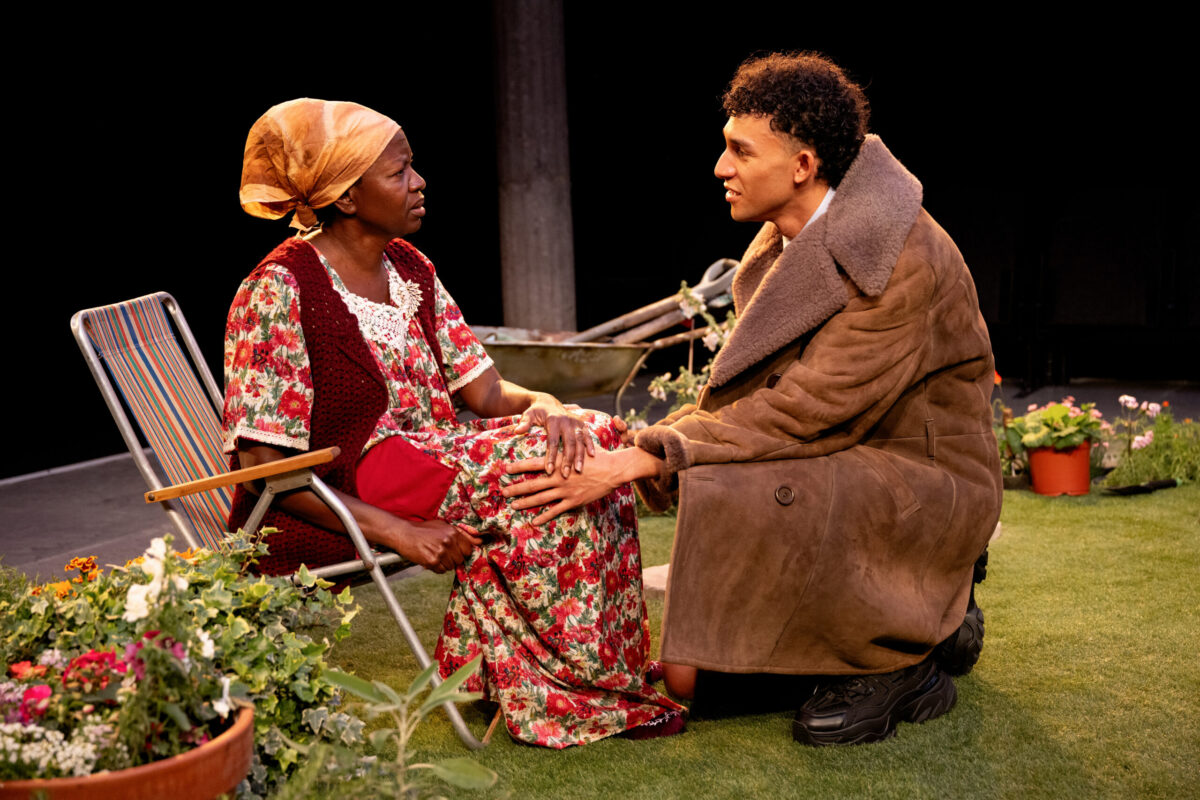Set in the back garden of a contemporary London house, Miss Myrtle’s Garden introduces us to its eponymous heroine, played with astonishing complexity by Diveen Henry. Miss Myrtle is an 82-year-old Jamaican-British woman who is grappling with dementia and is haunted by ghosts. She shares her home with her grandson Rudy (Michael Ahomka-Lindsay) and his boyfriend Jason (Elander Moore), who live upstairs and try—mostly in vain—to conceal their relationship from her disapproving gaze.
This is a play about place, memory, and the fierce complexity of familial love. At its heart is a portrait of a woman who is by turns irascible, humorous, and grieving. It is also, unmistakably, a vehicle for a single actress—and Henry delivers in full. Her embodiment of the prickly Miss Myrtle is razor-sharp — the shuffling gait, the muttering, the firecracker sparks of her sharp-tongued wit. Whether berating her husband Melrose (Mensah Bediako), admonishing Rudy, or locking horns with Eddie (Gary Lilburn), the affable and frequently drunk Irish neighbour who urinates in her garden, Henry commands the stage. That she is not even middle-aged makes the performance all the more remarkable.
Whilst Henry’s performance is the production’s centre of gravity, the surrounding cast and storylines don’t quite feel as well drawn. Characters in Miss Myrtle’s orbit often serve as plot devices rather than people. Rudy and Jason are indeed chalk and cheese — Rudy is a schoolteacher and Jason is employed in fashion, and their Act II breakup and resolution feel confusing. As written, the character of Eddie veers towards stereotype, and his deep emotional connection with Miss Myrtle feels more asserted than explored. Melrose’s death and reappearance as a silent ghost adds to the sadness and sense of loss.
Tonally, the play swerves between comedy and pathos, sometimes effectively, but not always with finesse. Some scene transitions are jarring, and the emotional temperature can shift without due cause. At its best, the dialogue is both biting and poignant, mixing domestic grit with lyrical sadness. At weaker moments, it feels plot-heavy or muddled in intent.
The production is anchored by an elegantly simple set: a round patch of grass that serves as the titular garden. Here, the characters dig, prune, and putter—tending not just to plants, but to memory and regret. It’s a quietly resonant space, well-used. The sound design echoes both the natural world of the garden, and Miss. Myrtle’s dreamlike internal world
While the play doesn’t always manage to weave together the narrative threads, it resonates in its portrayal of a family negotiating care and loss. Diveen Henry’s central performance brings to life a character who is maddening, hilarious, and profoundly human. It’s a piece about memory and loss, even when its storytelling doesn’t always land.
Miss Myrtle’s Garden
By: Danny James King
Director: Taio Lawson
Photo Credit: Camilla Greenwell
Designer: Khadija Raza
Sound Designer and Composer: Dan Balfour
Cast: Michael Ahomka-Lindsay, Mensah Bediako, Diveen Henry, Gary Lilburn, Elander Moore
Until: 12 July
Running time: 2 hours
Reviewed by: Wilder Gutterson

